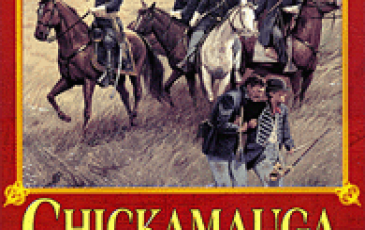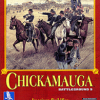9 Dec 61, Chusto-Talasha, IndTer - Battleground 9: Chickamauga

| Rating: | 0 (0) |
| Games Played: | 0 |
| SM: | 3 |
| Turns: | 12 |
| Type: | Custom |
| First Side: | CSA |
| Second Side: | Union |
| Downloads: | 28 |
9 December 1861, Chusto-Talasha, IndTer [Curt Cabbage]
The Battle of Chusto-Talasah (also known as Bird Creek, Caving Banks, and High Shoal) was fought December 9, 1861, in what is now Tulsa County, Oklahoma (then Indian Territory) during the American Civil War. It was the second of three battles in the Trail of Blood on Ice campaign for the control of Indian Territory during the American Civil War.
A series of battles were fought in December in bad weather between the Confederate Cherokee and Choctaw Indians and the Union Creek and Seminole Indians (led by the Muscogee Creek chief Opothleyahola) who supported the Federal government. Following Opothleyahola and his Union force’s defeat at Round Mountain, he retreated northeastward in search of safety. On December 9, 1861, the force was at Chusto-Talasah (Caving Banks) on the Horseshoe Bend of Bird Creek when Col. Douglas H. Cooper’s 1,300 Confederates attacked about 2:00 p.m. Chief Opothleyahola knew Cooper was coming and had placed his troops in a strong position in heavy timber at Horseshoe Bend.
For almost four hours, Cooper attacked and attempted to outflank the Federals, finally driving them across Bird Creek just before dark. Cooper camped there overnight but did not pursue the Federals because he was short of ammunition. The Confederates claimed victory. Chief Opothleyahola and his band moved off in search of security elsewhere. Their loss was estimated by Cooper as 500 (some accounts suggest 412). Confederate casualties were 15 killed and 37 wounded.
Although the Confederates had gained a minor tactical victory, they would win a resounding one later in the month at Chustenahlah.
The Chusto-Talasah battle site is on privately owned land near 86th Street North and Delaware Avenue, 5 miles northwest of modern Tulsa.
The Battle of Chusto-Talasah (also known as Bird Creek, Caving Banks, and High Shoal) was fought December 9, 1861, in what is now Tulsa County, Oklahoma (then Indian Territory) during the American Civil War. It was the second of three battles in the Trail of Blood on Ice campaign for the control of Indian Territory during the American Civil War.
A series of battles were fought in December in bad weather between the Confederate Cherokee and Choctaw Indians and the Union Creek and Seminole Indians (led by the Muscogee Creek chief Opothleyahola) who supported the Federal government. Following Opothleyahola and his Union force’s defeat at Round Mountain, he retreated northeastward in search of safety. On December 9, 1861, the force was at Chusto-Talasah (Caving Banks) on the Horseshoe Bend of Bird Creek when Col. Douglas H. Cooper’s 1,300 Confederates attacked about 2:00 p.m. Chief Opothleyahola knew Cooper was coming and had placed his troops in a strong position in heavy timber at Horseshoe Bend.
For almost four hours, Cooper attacked and attempted to outflank the Federals, finally driving them across Bird Creek just before dark. Cooper camped there overnight but did not pursue the Federals because he was short of ammunition. The Confederates claimed victory. Chief Opothleyahola and his band moved off in search of security elsewhere. Their loss was estimated by Cooper as 500 (some accounts suggest 412). Confederate casualties were 15 killed and 37 wounded.
Although the Confederates had gained a minor tactical victory, they would win a resounding one later in the month at Chustenahlah.
The Chusto-Talasah battle site is on privately owned land near 86th Street North and Delaware Avenue, 5 miles northwest of modern Tulsa.























